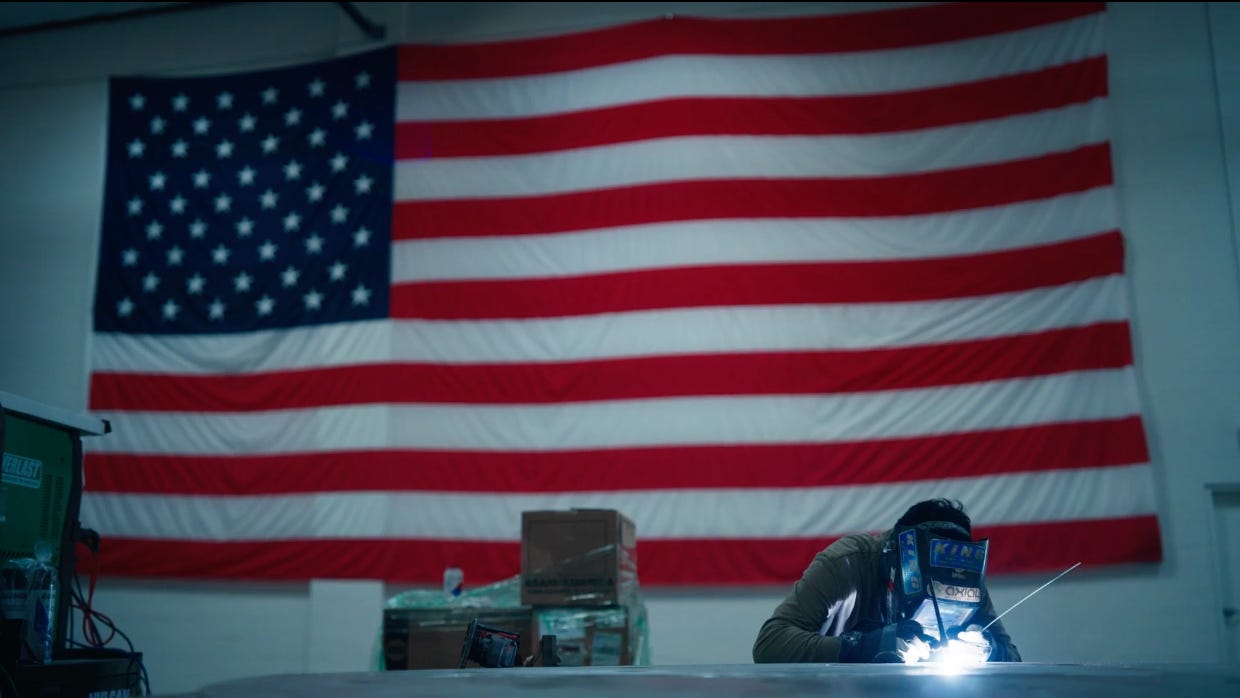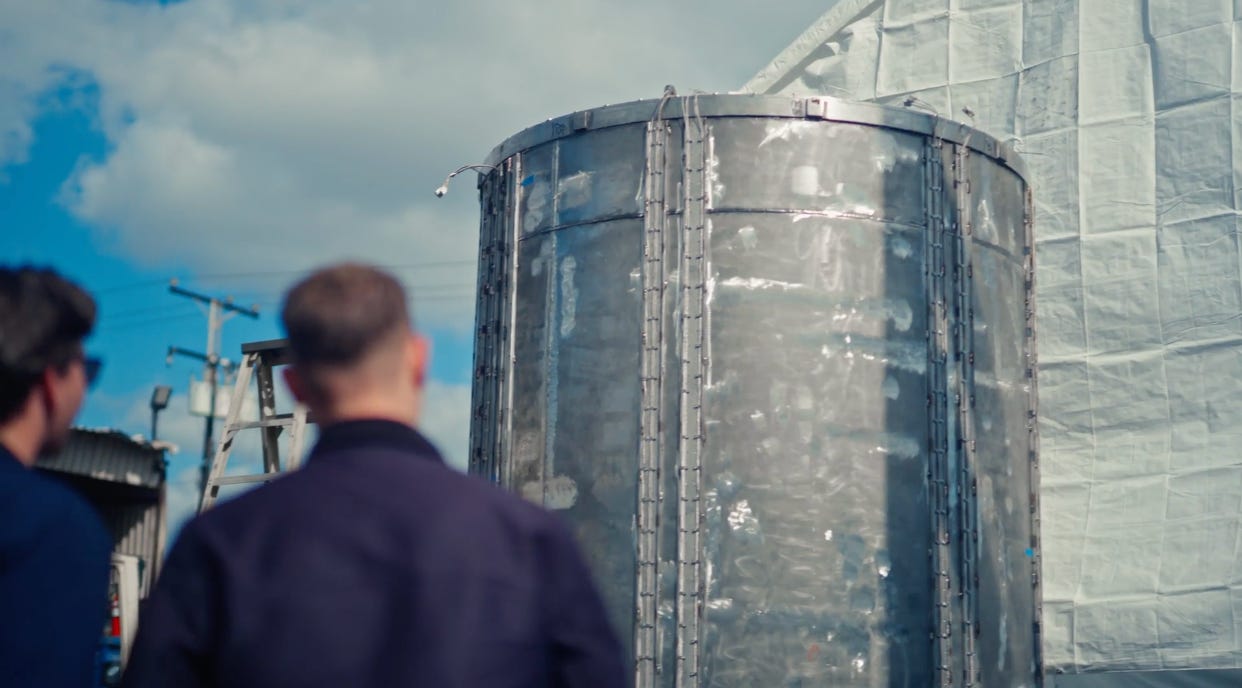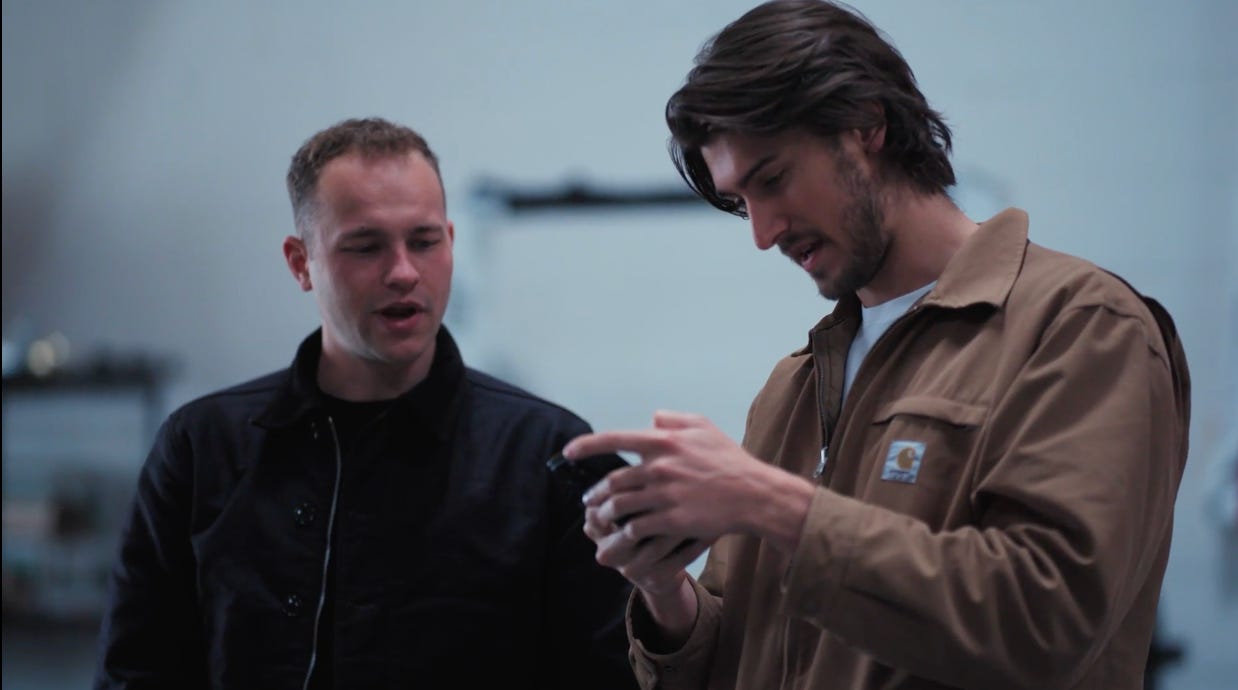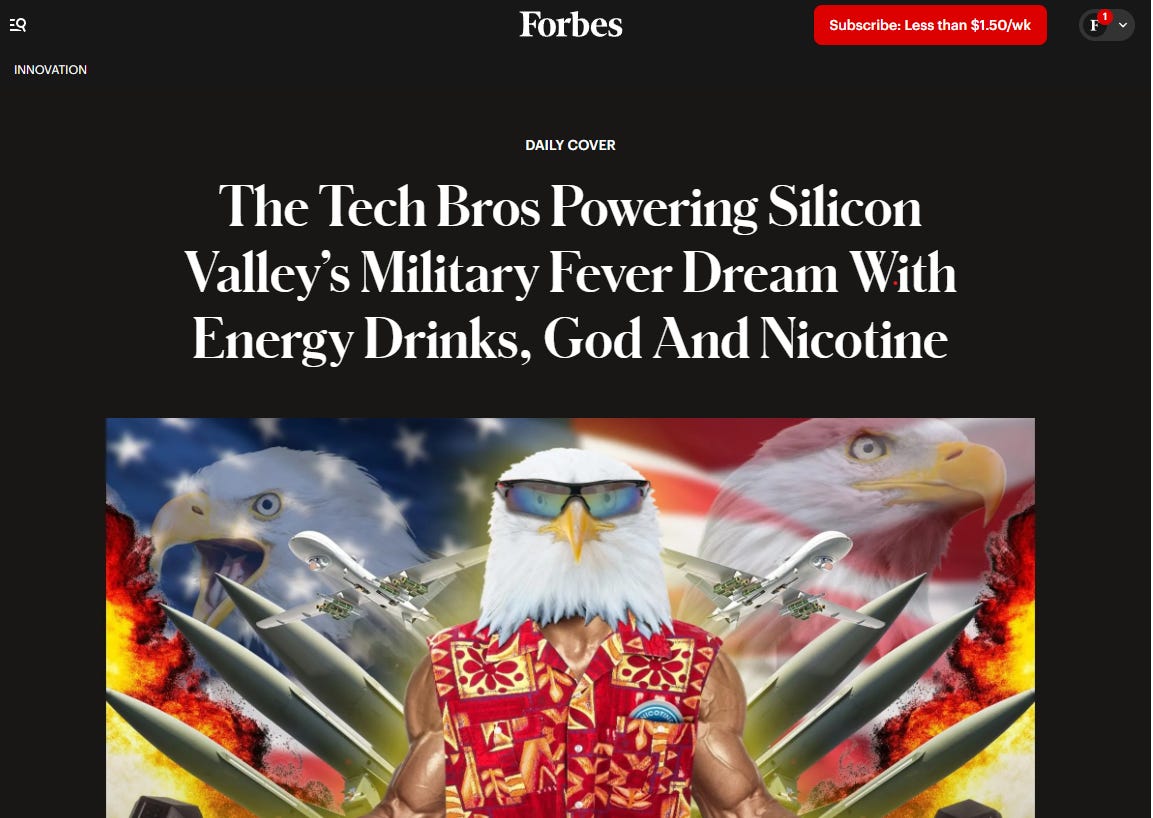
For decades, Silicon Valley defined American innovation. But lately, another name has started to surface — **The Gundo.**
El Segundo, California, a small town tucked between an oil refinery and LAX, has become home to a new generation of founders. They’re not building apps or ad tools. **They’re building rockets, reactors and factories.**
Some call it the birthplace of America’s next industrial revolution. Others call it hype.
To find out what’s really happening, I spoke with four founders who’ve been there since the beginning:
- [Augustus Doricko](https://www.linkedin.com/in/augustus-doricko-660b20145/): **Founder and CEO of** [**Rainmaker**](https://www.rainmaker.com/). A mechanical engineer developing technology that captures moisture from the air to create fresh water.
- [Cameron Schiller](https://www.linkedin.com/in/cam-schiller/): **Co-founder and CEO of** [**Rangeview**](https://rangeview.com/). An aerospace manufacturing founder based in El Segundo focused on advanced hardware production.
- [Zane Mountcastle](https://picogrid.com/team/zane-mountcastle): **Co-founder and CEO of** [**Picogrid**](https://picogrid.com/). An engineer building defense and industrial infrastructure through connected sensor systems.
- [Isaiah Taylor](https://www.linkedin.com/in/isaiahptaylor/): **Founder & CEO,** [**Valar Atomics**](https://www.valaratomics.com/). Founder and CEO of Valar Atomics. A nuclear-energy entrepreneur developing small modular reactors for industrial power.
---
### Inside the small California town fueling America’s next industrial revolution

> I think that people are going to talk about Gundo in the way that they talked about Florence in the Renaissance and Silicon Valley in the 80s.
>
> _Augustus Doricko_
> The monopoly on tech that San Francisco had for so long has been broken.
>
> _Zane Mountcastle_
This place is being called the birthplace of America’s next industrial revolution. But depending on who you talk to, it’s either the frontier of building or… a farce. It’s a place where young founders from around the country have moved to work together and build a new generation of deep tech companies.
> There’s just a feeling here in El Segundo.
>
> _Cameron Schiller_
> The level of absolute seriousness on the ground here truly cannot be overstated. Every single founder here has their life on the line, genuinely.
>
> _Isaiah Taylor_
And this story to me is kind of wild because I started filming these guys in the Gundo before that was even a thing people said or knew about, outside of the people who lived there. It’s now become a name brand.
For some, it represents building and pushing the limits of technology. For others, they question its validity. So we talked to four founders who have been there since the beginning to try and get the real story.
### Is it a farce or is it the future?

> I was an LA native, but I never knew about El Segundo. It’s this town that’s tucked between an oil refinery on one end and LAX on the other. You pop up over this little hill in a small town on Main Street and there are just arrays of American flags. Very proud to be in America. There’s just some feeling here in El Segundo that makes you appreciate the old, honest way of American life. We decided that that feeling was incredibly important to have during the origin of our company because it needs to be baked into our culture.
>
> _Cameron Schiller_
> Cameron said, well, yes, first of all, there’s more and better hardware talent here than anywhere else. We have all the warehouse space necessary for pre-seed companies. We have all the technicians from the primes and from the Chevron refinery that you could ever need. We’re close enough to these spectacular universities for atmospheric science and hires and also we’re close enough to the bay and there’s enough capital in LA that all those problems are solved for.
>
> _Augustus Doricko_
> LA just kept coming up over and over and over again. It’s a place where you walk into somebody, bump into them on the street and they’ve put hardware into space before. This insane talent density of people who have done hard things in the physical world.
>
> _Isaiah Taylor_
> SpaceX was started in El Segundo. I was now up the road in Hawthorne. You had all the SpaceX spin-outs that are doing things maybe not in space, a lot of are in space, but you have industrials and energy and manufacturing and sort of everything in between. And to see like that broader energy and just the broader appetite for solving these really hard problems that people in San Francisco would dismiss as not worth solving and then go out to their nice office tower and work on some enterprise SaaS as if that’s going to change the world. There was certainly something that was different.
>
> _Zane Mountcastle_
El Segundo started to produce more than just companies. It ended up producing a tight-knit community. Co-founders who were bonded by their belief that America needed a new model for progress.
> We moved in and realized there were a few other startups around us and they shared a similar attitude about this place, but it wasn’t popularized. We created a community around it, group chats and barbecues, bonfires.
>
> _Cameron Schiller_
> Every Friday night, we were burning our boxes and our pallets from what we’d received during the week. A lot of us were living in each other’s houses and each other’s factories. It’s very, very organic and it was really just driven by necessity. All of us had these unbelievably wild visions of what the future needed to look like and what we needed to do and it was not optional.
>
> _Isaiah Taylor_
> We just wanted the coolest people all to be in one neighborhood working on some of the world’s most important problems all at once.
>
> _Cameron Schiller_
> Not only does Iron Sharpen Iron in a business capacity, but also the synergies of having a friend that does XYZ industrial thing to help make your company move faster, hey, do you have this tool? Hey, do you have a vendor? Hey, do you have a freight forwarder? Do you have a connection at this department, et cetera? That is this compounding effect that is just benefiting each and every one of us more and more day over day.
>
> _Augustus Doricko_
### Why we need Gundo

For decades, America has quietly been giving up its ability to build.
In 1971, one in four Americans worked in manufacturing. _Today, it’s barely one in 13._
When China joined the World Trade Organization in 2001, US companies chased cheap labor overseas. Within 10 years, we lost nearly 6 million factory jobs, a third of the entire sector. Economists call it the “China shock.”
**So why is this new wave of reindustrialization even happening in America?**
When the US was founded, 90% of people worked the land. We were a nation of farmers, but within a century, we built railroads, steel mills, and factories that made a quarter of the world’s goods. By 1900, the US had overtaken Britain as the world’s largest manufacturer, producing about 24% of global industrial output. By the 1950s, nearly one in three American workers had a job in manufacturing, and factories powered 28% of the US economy. At that point, we built half of the world’s goods, from cars to microchips. In 1979, manufacturing employment peaked at 19.6 million workers. By 2019, it was down to 12.8 million, a 35% drop. Within a decade, we lost 5.8 million factory jobs, about a third of the entire sector. China didn’t just offer cheap labor. It built full industrial ecosystems, design, prototype, assembly, and shipping, all in one place. China used to be associated with making cheap goods, but that’s not the case in 2025 anymore. They’re at the forefront of mass manufacturing high-quality electronic and non-electronic goods.
Meanwhile, US corporations chased higher margins, and policymakers assumed the market would adjust. It didn’t. Manufacturing share of GDP fell from 16% in 1997 to 11% by 2010. Today, fewer than 13 million Americans work in manufacturing, less than 10% of our workforce.
But it wasn’t just jobs we lost in exchange for cheaper parts. It was the tribal knowledge associated with building. We need to make building things in the real world feel valuable again and important, personally and culturally. Now, as supply chains crack and rivals rise, we’re realizing something. **If we want to control our future, we have to build again.** And that’s what makes El Segundo so interesting. It’s a small town trying to bring back America’s builders, not just in reality, but in spirit.
### From a Twitter storm to a movement

Then came the Twitter storm, memes, magazines, hype, and attention. El Segundo became a caricature: Bible-thumping startup bros pushing iron and quoting the Founding Fathers. Media outlets swarmed.
I asked the founders about their perspective on the characterization of Gundo.
> Augustus and Isaiah really went in on the community building, and they were unapologetic about their ways of life. What they shared in common was a love of their God and cigarettes. It was incredible excellence happening all around, but those two comments got picked up, and the media went nuts on it. Eight months to like 12 months in, there was just a stream every other week. There was just news article after news article.
>
> _Cameron Schiller_
> The journalist came in, and she kind of did the whole tour, visited all the founders, and I think was really trying to understand, like, what is the root of this? When you get down to it, you know, it’s just a bunch of young founders who are really eager to build really hard things in the real world and building things in the interest of the country.
>
> _Zane Mountcastle_
> Many, many late nights of checking on each other’s factories and saying, you know, are you still working? It’s 2 a.m. What’s going on? You’re not home yet, are you? So that really drove a lot of our early success, I think, in being that hardcore.
>
> _Isaiah Taylor_
Things have become more serious for every single company. It feels like every single company has grown exponentially and in a very real way.
To me, it sort of just feels like the hours were put in, and then at a certain point, the ball starts beginning to roll down the hill and up towards the next one.
> The guys are killing it. The neighborhood’s on fire, man. Not just in like a Twitter way. If you walk the streets and you see the numbers that are pushing out of these companies, I mean, just the headline figures written in that tweet are pretty crazy to think about what has been built here. People are working till 2 a.m. every night. People are serious about what it means to create something. This isn’t hype. People are actually trying to solve the problem here. They’re trying to solve these big, hairy problems that we’ve set out to build.
>
> _Cameron Schiller_
> I think that our nation’s situation is very dire and it should be handled with sobriety, but not somberness.
>
> _Augustus Doricko_
> So there’s this seriousness. There’s this grit. There’s this willingness to sleep on the factory floor that’s hard to find anywhere else.
>
> _Isaiah Taylor_
These guys are working to solve _real problems._
El Segundo is more than a little sliver on California’s map. **It’s proof that the spirit of American innovation can thrive outside of Silicon Valley**. It’s a small town surrounded by jet fuel and ocean air. Young builders are proving that ambition and grit still matter today as they inspire one another to build the future of American industry.
> Why did El Segundo not happen in San Francisco? The monopoly on tech that San Francisco had for so long has been broken. Think about moats and technology, right? I think if you told someone a couple of years ago that that would be shattered, I think people would look at you cross-eyed. The way we broke it was by being something different, realizing that technology needs to be deployed to the other 90% of the GDP that SaaS is not. History is riddled with examples of a half dozen people kind of come together and change an industry. Think about American literature in Paris, for example. It wasn’t that many people. They just happened to be hanging out at the same bars and cafes.
>
> _Zane Mountcastle_
> When a young man or woman comes up to me in Gundo and says, I’m not sure exactly what I want to do with my life. I’m having a really hard time orienting myself in the world. I’m not sure what the point is, but I want to help build something great and meaningful. That is one of the best consequences of everything that we’ve done. Making more water is a big deal. Making energy abundance a big deal. Making real material things in the world. All of this is great, but just being able to give people some vision for the future, that is one of the most important things. We have to sacrificially build hard, real material things to create a future worth living in and a future that honors all of the great Americans and industrialists that gave us the world that we live in and also provides for the well-being and ambition of those that come after us.
>
> _Augustus Doricko_
> I get reachouts all the time from young people saying, you inspired me to start this. You inspired me to do that. But there is something legitimately special going on here. If you are trying to start something incredibly hard in the real world, I cannot recommend enough that you come here and join us. The reason is you actually do need that community and the ecosystem, the talent. There’s just people here who know how to see around all of the technical corners that you need to see around, who have been there, who have done it. If you’re a young person who’s motivated about building the future of American industry, you actually need those old heads on your side. That is very core to American DNA is that we build things. We make railroads. We make trains. We make airplanes. We make cars. It’s just very much who we are.
>
> _Isaiah Taylor_
> And El Segundo is run on jet fuel. You can feel it. And we need that across the country because we need Americans to start to feel responsible again– for their country, for their peers, for their family. This isn’t about who is a victim. This is about who can take this country forward and build what we need to build. And that’s going to happen in a place that’s made on top of a machine that pushes the world forward. America needs this at a greater scale. We used to have this. I mean, look back in time. Some of the most important cultural hubs were the places that had this activity, that had Americans working hard to push the country forward. And that’s not coming from little nice coffee shops on the corner with everyone on their laptops. That builds something different. And it might be a consequence of the abundance that the country has seen for some decades. I believe when the Western pioneer came out, looked across the plains and saw nothing, he thanked his God, he thanked the ground and family. And then he picked up a tool and got to work. There’s no guaranteed rocking charity of his time. There was no society coddling you to do something. You had personal responsibility for your family. And when you come to a factory town that has that in its soil, you could feel the sweat from the prior people that put their life into it. You can feel it in the ground and it makes you want to be a part of something great.
>
> _Cameron Schiller_
In my mind, and in the minds of many others, El Segundo represents more than just a place. It’s become a movement. And El Segundo isn’t the only model for the future, but it’s proof that communities of builders can still emerge in America and inspire others.
There’s a whole new tranche of companies that have been founded there since these guys founded theirs. Will these ones make it? Will they go bust? Will they have an impact on the way we build things in America? Or will things return to how they’ve been recently?
One thing’s for certain, these companies _have_ grown. They’ve raised more money, hired more people, and have built a lot of hardware as of late.
I’m sure they’ll all have very exciting announcements soon. We’ll be covering them.
_Until next time, keep on building the future!_
*–Jason*